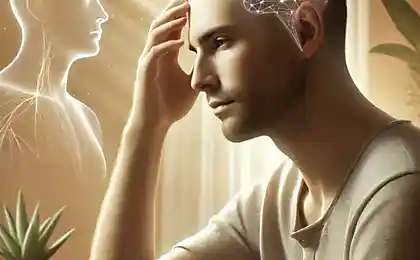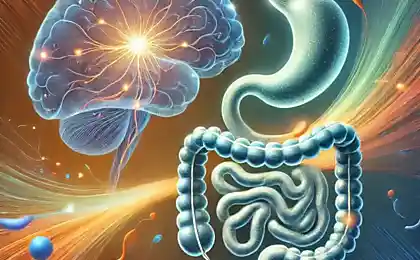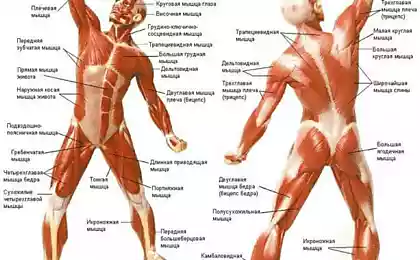712
A different perspective on psychosomatic illness
To date, the therapeutic processing of the patient suffering from various diseases, stands firmly on three main "treating" pillars: medicine, alternative medicine, and psychosomatic medicine.
The first "kit" is familiar to each of us: this is the official medical institution whose activities are subject to academic ideas about the causes of disease and methods of its cure. The disease always is "bodily damage" caused by a particular cause, and its cure lies or to eliminate the causes of the "failure" (e.g., unhealthy lifestyle), or its "repair" (gypsum), or prophylactically (use vitamins).
The second "whale", who uses traditional popularity among the masses based on ideas about non-empirical (unverifiable, unprovable) the causes of disease: the damage and the evil eye, a curse and "weak energy" bad karma, "God's punishment", and more. The disease in this case is a consequence or influence of some "evil forces", or a wrong moral and spiritual way of life, and your treatment is or prevent the influence of "evil forces" (damage removal), or strengthening your protection (amulets and talismans), or the compulsion to lead a "proper life" (to forgive injuries, to be honest, not to steal and not to lie).
And finally, our third "whale"is a new-fangled psychosomatic illness, which became very popular from the time of the birth of Sigmund Freud.

In this case, most diseases are caused by psychological reasons, and unexpressed and suppressed us aggression becomes a cause of tooth decay and brittle bones, unwillingness to see the world literally leads to myopia, irritability leads to skin diseases, and so on. In these cases, the psychologist (therapist) sees physical disease only as a symptom, a manifestation of psychological illness, and works exclusively with the first. And once the psychological problem is eliminated, the disease disappears by itself.
None of the fundamental approaches to the treatment of the patient – there is no unity, and is not, of course, and psychosomatic medicine. And, for example, strictly in the psychological key to the interpretation of the disease, it can be seen from different points of view, namely:
Disease – as a result
In this case, the disease has forced the condition of the body caused by the presence of psychological problems.
Take, for example, aggression: if it is all the time to suppress volitional force, thus if you would give orders the body not to produce certain chemicals that contribute to the expression of aggression. And hormones the "attacks" cease to be produced by the body in the right amount, and some "hormones of fear and panic", by contrast, appear in excess. And this leads to "physical damage".
In this case, it is believed that the elimination of unfavorable psychological condition resolves automatically and consequence of the disease. The parameters of the body come back to normal, and the disease disappears.
Disease – as a signal or metaphor
The more complicated case psychological interpretation of the disease. In this case, it is assumed that our disease is an informational message only on one or another human activity that threatens the traumatic effects of psychological or physical. Suppose that the child in the childhood very much scared of the big bearded guy. He may not want that, but it was an accident. The child grew up, and he has long forgotten about this man with a black beard. All fine and dandy, but he gets a new job, and his boss, a big guy with a thick black beard. Starts.
Unconsciously, people remember about their fear and pain, but consciously he doesn't remember it. Subconscious is screaming: "Danger! Every man for himself!". But the consciousness does not see any danger, and the man continues to be in threat (from an unconscious perspective) position.
In this case, the disease is considered as a symbolic message from our unconscious that some activity is very dangerous. For example, work is constantly starting to ache. It's like a message: "Get out of here, you here."! Any illness in this sense is intended to be a subconscious warning about the danger.
The cure in this case, perhaps at least two ways. The first one is most simple: as soon as the irritant will disappear will disappear and the disease. But from the point of view of psychology is ineffective and even malicious way: if people all would have reacted just avoidance, it fire could ignite. So more productive will be the second way: this awareness of the true causes of the anxiety of our unconscious. And in the process of psychoanalysis or any other therapy we remember and understand, what exactly wants to tell us our subconscious. Once awareness occurs, the disease begins to go better.
Disease – as a source of benefits
Than further in wood, the thicker guerrillas, as they say. And the disease is a special case of the psychological concept of "secondary gain," or such a situation (and state) when a negative reason has a positive consequence, which does not occur without the presence of negative causes. A simple example: if you are sick, we care for you loved ones is increasing. If you want to communicate (something to do), then the headache can free you from this action. And the like.
Disease – as compensation
And in this case, the disease is interpreted as the ability to Express their psychological need for physical form. What does it mean? Take the example of a man who forbade himself to cry. Boys don't cry and all that jazz. In this case, people can "cry" body: either he will begin to sweat, or it will have a permanent "strange" urge to urinate. The need for security can trigger excessive deposition of adipose tissue ("armor") or diseases of the skin (second skin). Summarizing, we can say this: if people cannot satisfy their need psychologically, he will partially satisfy her bodily, irrational, giving rise to a disease "easy" to meet this need.
Disease as synchronization
Synchronizing the clock, we bring them to one common value. For example, if your room have two clocks that show different times, some of them are (at least) are lying. And what does one do in this case?! It causes all clocks to a single value that it assumes the reference.
How it "works" at the level of the disease? Let's say we have a gentleman who often "moan" about how it is bad, but on the physical plane is not shown. In this case, after some time, the disease can actually appear as one of the "hours" (or bodily, or psychological) is clearly going wrong. And then a lot depends on what the subject considers as true, the reference "time": and if it is a disease, he can really get sick.
Another possible variant of such a conflict is when part of the bodily feeling and mental feeling of the same act clearly contradict each other.
And, for example, you may think that is able to lift a hundred pounds weight, although, actually, you risky to raise even a third of that weight. Or, for example, due to various reasons, you have to work every day (at least mentally, even physically) for ten hours a day, although, actually, you are able to work productively much less time, plus, every two hours you want to take a NAP. In this case, as the disease, and the third state (intermediate state between health and disease) will occur in exact proportion to your efforts to overcome your resource of the body. Until then, until you become adequate to your resources (the right to use them, or accumulate, or to redistribute), your painful condition will worsen.
Disease – like program
In a trance any person can be convinced that icicle that touches his skin, there is a hot rod, and will appear on the skin natural burn.
And if our mind can so modify the physiological reaction to stimuli, relying on representations and beliefs about the nature of these stimuli (TRANS or not TRANS, doesn't matter), then why not assume that the basis of most of the diseases or of third States are incorrect (malicious) views of our intelligent mind?!
In this case, the disease is erroneous, malicious, false, incorrect, unclear or confusing program that leads to damage and breakage. And Allergy or phobia, for example, is a typical program of response to the stimulus generated a single experience, or even abstract. It all depends on how you think. And if you ate an orange, and you were bad, then we can think about different things. We may think that it's a bad orange, go and quarrel with the salesman who sold you it. And you may think that you have an Allergy to oranges. And then you will be allergic to oranges, no problem.
You know, there are people who think they can walk on hot coals and not get burned. And they go and do not get burned. And there are people who think that they have or Allergy, or a phobia, or something. And they got it. And, depending on what you think you have it.
Psychosomatics, for example, poor vision
From the position of optometrist poor vision can be due to any of three reasons: it is heredity, or injury, or harmful habits (to read in the dark, watching TV too close or for too long, etc.).
But from the perspective of a psychologist-psychosomatics his first guess about the cause of the disease may indicate an unconscious unwillingness of the patient something to see, something to notice. Optometrist at the reception asked: "how Many of you, my friend, are reading, and what is the vision your parents?", a psychologist might ask: "Think and tell me what and who you really don't want to see, but are forced to do it!?"
At such statement of a question it is easy to see that all our explanations of the causes of the disease have a right to exist – and at the same time.
And poor vision would be – as a direct result of repressed desire not to see something (or) someone. And poor vision would be – as a signal (a metaphor, a message) that want and need something and someone not to see became unbearable, and satisfy her, to avoid malicious stimulus, there is no way. Losing sight of the person behind it gets "secondary gain", that is, becomes able to see closely what he does not want to see. And he can not dispose of life so that the stimulus has disappeared from his field of vision, so the weakening of my vision, it eases the psychological experience (compensation).
And forced to see what he does not want to see, a person creates a contradiction between the parts of their experience (good vision on the one hand and "bad" psychological vision on the other), and his good vision, is equated to the "psychological vision" (sync). And finally, it is obvious that the man thus creates in his mind tough program "bad" visual experience (it manifests itself in the words: "see you don't want", "get out of my face", "my eyes have not seen you", "don't let me eyes" and "see you sick," and so on and so forth).
Of course, that reluctance to see someone – is not the only cause of poor vision, and I only for example screwed. With equal "success" eyesight can deteriorate from an equally strong desire to see anyone. Not did you, by the way, the attention to the fact that the youth vision deteriorates, usually with minus (myopia or nearsightedness), and the elderly with a plus sign (hyperopia)!?
I have even on this occasion there was one interesting theory: the fact that our past and future independent of our vision. We don't need sight in itself to see the desired future, and we don't need vision to scroll in the head "film of the past." We use so-called "inner vision", or we are able visually to recall seen pictures, or to construct a new picture of the items previously seen. Our eyes can be closed.
Older people have a lot of the past, all their past experience dominates the present and future. And young people's "perspectives" is "still ahead", is "the future".
In this case, we can assume that the frequent recourse to images of the future leads us to myopia, and frequent recourse to the past, to hyperopia. I'm not going to convince you that this is so, it's just a theory.
But at least it gives me an answer how such an amazing vision in people with age varies from minus to plus, with myopia to hyperopia. It may also be noted that people in the present time, all the time "here and now" have very little chance to damage the eyesight, because all the time I use only physiological vision, and very little vision, so to say, psychological.
Another theory deteriorating vision somehow I already told you: in my opinion, this is associated with the establishment of compulsory physical limitations on view distance. Such boundaries are the walls of houses, fences, books, computer screen and TV, etc.
Before eyes all time there is an obstacle on which you focus view, and this distance is enforced, does not depend on you that houses are bigger, the streets more closely, what you need to read more and more that look all the time like in a cage, restricted physically impenetrable barriers. This problem primarily relates to major cities, cities, like new York or Moscow, and the higher their density, the more closely compacted life, the more people vision deteriorates.
But indirectly it can attest to the fact that on opening large areas without any obstacles (the Ferris wheel, the top floor of a multistory building) there is some kind of strange "visual euphoria". Perhaps our eyes at this moment feel like the escaped prisoner who enjoys freedom.
Finally, I have another theory that visual disturbances can be associated with the type and style of thinking. The fact that in addition to our eyes, we have another kind of "eyes" that are able to see at any distance, which can overcome any obstacles that equally well can see and night and day. These "eyes" – our mind. The mind is able to simulate visual sensations without any connection with the fact that at this point in time see with our own eyes. And it is interesting to note that there are many idiomatic expressions that clearly indicate this type of "vision": "what a visionary", "behold the root", "can not see beyond their nose" and so forth.
However, I have not yet found a clear answer to the question of how one relates to others. For example, we can say that the person who reads a lot, has a lot of chances to weaken your eyesight. But you could say something completely different: a man who reads a lot, all the time generates visual picture in my head, which is not the reality. Or, in other words, it uses physical sight to see the psychological "look" in his eyes, in fact, become a vestige touch psychological view. The true visual function all the time is inhibited, and we are forced to do something (e.g. watch a movie) to fix it (as, for example, we go to the gym to run on the treadmill and pedal, to somehow keep the resource muscle activity).
But it's all of the above, as comrade hamlet, "words, words, words". As you can see, the possible causes and consequences are many – and each of them probably has a "hint", the highlight. Let's just say this is a good occasion to think about for all those who consider the subject relevant and interesting.
Symbolic disease symbolic treatment
No matter which theory is correct all the others, and it is important that this little lesson is to treat medicine psychology. And if a certain disease is a symptom, plus more, and giving you a secondary relief (secondary benefit, the reduction of contradictions and compensation), medical intervention organizises puts the patient in an extremely difficult situation. If the person is "crying body," because it's got it into his head that he can't cry that he's above all that, and the doctor begins to remove his disease, or another drug, the subconscious mind of the patient is in the condition of the rat that is cornered. For the subconscious in this case the treatment of the disease is tantamount to attempted murder, and it is obvious that it will desperately resist, and the disease to worsen or manifest themselves in new and unexpected guises.
Therefore, if you suffer from one or another ailment, and the medicine and could not help you, then think about how to ask for help to a therapist. Psychotherapists today work effectively with many diseases, and the results are very good. Psychotherapy lends itself to the sterility and asthma, allergic diseases, many gastrointestinal disorders, impotence, enuresis, skin diseases, and others. In any case you should at least consult a psychologist working with psychosomatic diseases.
However, it is not necessary to expect from psychological approach to the treatment of something supernatural and lightning. Lightning on TV Kashpirovsky, but in General therapy of psychosomatic diseases – not a quick process, it will take from 3 to 15 sessions, and more. I will more precisely tell the therapist in each case.
Theoretically you'll be able to cope with many diseases. Because if you share the concept of a psychosomatic explanation of the causes of diseases, it is obvious that by eliminating adverse psychological experiences, and you eliminate the disease itself.
Treatment in psychosomatics exactly the same result as the disease itself, it is no "cycle": this is the "key" to your psychological condition, and the disease will show the way and help the therapist to find the cause of your problem. Here it is, dear (your real problem), the therapist "and will eat". And the records he has no business. Themselves will take place gradually, not going anywhere. published
Author: Vit Zenev
P. S. And remember, only by changing their consumption — together we change the world! ©
Join us in Facebook , Vkontakte, Odnoklassniki
Source: psyberia.ru/mindterritory/psychosoma
The first "kit" is familiar to each of us: this is the official medical institution whose activities are subject to academic ideas about the causes of disease and methods of its cure. The disease always is "bodily damage" caused by a particular cause, and its cure lies or to eliminate the causes of the "failure" (e.g., unhealthy lifestyle), or its "repair" (gypsum), or prophylactically (use vitamins).
The second "whale", who uses traditional popularity among the masses based on ideas about non-empirical (unverifiable, unprovable) the causes of disease: the damage and the evil eye, a curse and "weak energy" bad karma, "God's punishment", and more. The disease in this case is a consequence or influence of some "evil forces", or a wrong moral and spiritual way of life, and your treatment is or prevent the influence of "evil forces" (damage removal), or strengthening your protection (amulets and talismans), or the compulsion to lead a "proper life" (to forgive injuries, to be honest, not to steal and not to lie).
And finally, our third "whale"is a new-fangled psychosomatic illness, which became very popular from the time of the birth of Sigmund Freud.

In this case, most diseases are caused by psychological reasons, and unexpressed and suppressed us aggression becomes a cause of tooth decay and brittle bones, unwillingness to see the world literally leads to myopia, irritability leads to skin diseases, and so on. In these cases, the psychologist (therapist) sees physical disease only as a symptom, a manifestation of psychological illness, and works exclusively with the first. And once the psychological problem is eliminated, the disease disappears by itself.
None of the fundamental approaches to the treatment of the patient – there is no unity, and is not, of course, and psychosomatic medicine. And, for example, strictly in the psychological key to the interpretation of the disease, it can be seen from different points of view, namely:
Disease – as a result
In this case, the disease has forced the condition of the body caused by the presence of psychological problems.
Take, for example, aggression: if it is all the time to suppress volitional force, thus if you would give orders the body not to produce certain chemicals that contribute to the expression of aggression. And hormones the "attacks" cease to be produced by the body in the right amount, and some "hormones of fear and panic", by contrast, appear in excess. And this leads to "physical damage".
In this case, it is believed that the elimination of unfavorable psychological condition resolves automatically and consequence of the disease. The parameters of the body come back to normal, and the disease disappears.
Disease – as a signal or metaphor
The more complicated case psychological interpretation of the disease. In this case, it is assumed that our disease is an informational message only on one or another human activity that threatens the traumatic effects of psychological or physical. Suppose that the child in the childhood very much scared of the big bearded guy. He may not want that, but it was an accident. The child grew up, and he has long forgotten about this man with a black beard. All fine and dandy, but he gets a new job, and his boss, a big guy with a thick black beard. Starts.
Unconsciously, people remember about their fear and pain, but consciously he doesn't remember it. Subconscious is screaming: "Danger! Every man for himself!". But the consciousness does not see any danger, and the man continues to be in threat (from an unconscious perspective) position.
In this case, the disease is considered as a symbolic message from our unconscious that some activity is very dangerous. For example, work is constantly starting to ache. It's like a message: "Get out of here, you here."! Any illness in this sense is intended to be a subconscious warning about the danger.
The cure in this case, perhaps at least two ways. The first one is most simple: as soon as the irritant will disappear will disappear and the disease. But from the point of view of psychology is ineffective and even malicious way: if people all would have reacted just avoidance, it fire could ignite. So more productive will be the second way: this awareness of the true causes of the anxiety of our unconscious. And in the process of psychoanalysis or any other therapy we remember and understand, what exactly wants to tell us our subconscious. Once awareness occurs, the disease begins to go better.
Disease – as a source of benefits
Than further in wood, the thicker guerrillas, as they say. And the disease is a special case of the psychological concept of "secondary gain," or such a situation (and state) when a negative reason has a positive consequence, which does not occur without the presence of negative causes. A simple example: if you are sick, we care for you loved ones is increasing. If you want to communicate (something to do), then the headache can free you from this action. And the like.
Disease – as compensation
And in this case, the disease is interpreted as the ability to Express their psychological need for physical form. What does it mean? Take the example of a man who forbade himself to cry. Boys don't cry and all that jazz. In this case, people can "cry" body: either he will begin to sweat, or it will have a permanent "strange" urge to urinate. The need for security can trigger excessive deposition of adipose tissue ("armor") or diseases of the skin (second skin). Summarizing, we can say this: if people cannot satisfy their need psychologically, he will partially satisfy her bodily, irrational, giving rise to a disease "easy" to meet this need.
Disease as synchronization
Synchronizing the clock, we bring them to one common value. For example, if your room have two clocks that show different times, some of them are (at least) are lying. And what does one do in this case?! It causes all clocks to a single value that it assumes the reference.
How it "works" at the level of the disease? Let's say we have a gentleman who often "moan" about how it is bad, but on the physical plane is not shown. In this case, after some time, the disease can actually appear as one of the "hours" (or bodily, or psychological) is clearly going wrong. And then a lot depends on what the subject considers as true, the reference "time": and if it is a disease, he can really get sick.
Another possible variant of such a conflict is when part of the bodily feeling and mental feeling of the same act clearly contradict each other.
And, for example, you may think that is able to lift a hundred pounds weight, although, actually, you risky to raise even a third of that weight. Or, for example, due to various reasons, you have to work every day (at least mentally, even physically) for ten hours a day, although, actually, you are able to work productively much less time, plus, every two hours you want to take a NAP. In this case, as the disease, and the third state (intermediate state between health and disease) will occur in exact proportion to your efforts to overcome your resource of the body. Until then, until you become adequate to your resources (the right to use them, or accumulate, or to redistribute), your painful condition will worsen.
Disease – like program
In a trance any person can be convinced that icicle that touches his skin, there is a hot rod, and will appear on the skin natural burn.
And if our mind can so modify the physiological reaction to stimuli, relying on representations and beliefs about the nature of these stimuli (TRANS or not TRANS, doesn't matter), then why not assume that the basis of most of the diseases or of third States are incorrect (malicious) views of our intelligent mind?!
In this case, the disease is erroneous, malicious, false, incorrect, unclear or confusing program that leads to damage and breakage. And Allergy or phobia, for example, is a typical program of response to the stimulus generated a single experience, or even abstract. It all depends on how you think. And if you ate an orange, and you were bad, then we can think about different things. We may think that it's a bad orange, go and quarrel with the salesman who sold you it. And you may think that you have an Allergy to oranges. And then you will be allergic to oranges, no problem.
You know, there are people who think they can walk on hot coals and not get burned. And they go and do not get burned. And there are people who think that they have or Allergy, or a phobia, or something. And they got it. And, depending on what you think you have it.
Psychosomatics, for example, poor vision
From the position of optometrist poor vision can be due to any of three reasons: it is heredity, or injury, or harmful habits (to read in the dark, watching TV too close or for too long, etc.).
But from the perspective of a psychologist-psychosomatics his first guess about the cause of the disease may indicate an unconscious unwillingness of the patient something to see, something to notice. Optometrist at the reception asked: "how Many of you, my friend, are reading, and what is the vision your parents?", a psychologist might ask: "Think and tell me what and who you really don't want to see, but are forced to do it!?"
At such statement of a question it is easy to see that all our explanations of the causes of the disease have a right to exist – and at the same time.
And poor vision would be – as a direct result of repressed desire not to see something (or) someone. And poor vision would be – as a signal (a metaphor, a message) that want and need something and someone not to see became unbearable, and satisfy her, to avoid malicious stimulus, there is no way. Losing sight of the person behind it gets "secondary gain", that is, becomes able to see closely what he does not want to see. And he can not dispose of life so that the stimulus has disappeared from his field of vision, so the weakening of my vision, it eases the psychological experience (compensation).
And forced to see what he does not want to see, a person creates a contradiction between the parts of their experience (good vision on the one hand and "bad" psychological vision on the other), and his good vision, is equated to the "psychological vision" (sync). And finally, it is obvious that the man thus creates in his mind tough program "bad" visual experience (it manifests itself in the words: "see you don't want", "get out of my face", "my eyes have not seen you", "don't let me eyes" and "see you sick," and so on and so forth).
Of course, that reluctance to see someone – is not the only cause of poor vision, and I only for example screwed. With equal "success" eyesight can deteriorate from an equally strong desire to see anyone. Not did you, by the way, the attention to the fact that the youth vision deteriorates, usually with minus (myopia or nearsightedness), and the elderly with a plus sign (hyperopia)!?
I have even on this occasion there was one interesting theory: the fact that our past and future independent of our vision. We don't need sight in itself to see the desired future, and we don't need vision to scroll in the head "film of the past." We use so-called "inner vision", or we are able visually to recall seen pictures, or to construct a new picture of the items previously seen. Our eyes can be closed.
Older people have a lot of the past, all their past experience dominates the present and future. And young people's "perspectives" is "still ahead", is "the future".
In this case, we can assume that the frequent recourse to images of the future leads us to myopia, and frequent recourse to the past, to hyperopia. I'm not going to convince you that this is so, it's just a theory.
But at least it gives me an answer how such an amazing vision in people with age varies from minus to plus, with myopia to hyperopia. It may also be noted that people in the present time, all the time "here and now" have very little chance to damage the eyesight, because all the time I use only physiological vision, and very little vision, so to say, psychological.
Another theory deteriorating vision somehow I already told you: in my opinion, this is associated with the establishment of compulsory physical limitations on view distance. Such boundaries are the walls of houses, fences, books, computer screen and TV, etc.
Before eyes all time there is an obstacle on which you focus view, and this distance is enforced, does not depend on you that houses are bigger, the streets more closely, what you need to read more and more that look all the time like in a cage, restricted physically impenetrable barriers. This problem primarily relates to major cities, cities, like new York or Moscow, and the higher their density, the more closely compacted life, the more people vision deteriorates.
But indirectly it can attest to the fact that on opening large areas without any obstacles (the Ferris wheel, the top floor of a multistory building) there is some kind of strange "visual euphoria". Perhaps our eyes at this moment feel like the escaped prisoner who enjoys freedom.
Finally, I have another theory that visual disturbances can be associated with the type and style of thinking. The fact that in addition to our eyes, we have another kind of "eyes" that are able to see at any distance, which can overcome any obstacles that equally well can see and night and day. These "eyes" – our mind. The mind is able to simulate visual sensations without any connection with the fact that at this point in time see with our own eyes. And it is interesting to note that there are many idiomatic expressions that clearly indicate this type of "vision": "what a visionary", "behold the root", "can not see beyond their nose" and so forth.
However, I have not yet found a clear answer to the question of how one relates to others. For example, we can say that the person who reads a lot, has a lot of chances to weaken your eyesight. But you could say something completely different: a man who reads a lot, all the time generates visual picture in my head, which is not the reality. Or, in other words, it uses physical sight to see the psychological "look" in his eyes, in fact, become a vestige touch psychological view. The true visual function all the time is inhibited, and we are forced to do something (e.g. watch a movie) to fix it (as, for example, we go to the gym to run on the treadmill and pedal, to somehow keep the resource muscle activity).
But it's all of the above, as comrade hamlet, "words, words, words". As you can see, the possible causes and consequences are many – and each of them probably has a "hint", the highlight. Let's just say this is a good occasion to think about for all those who consider the subject relevant and interesting.
Symbolic disease symbolic treatment
No matter which theory is correct all the others, and it is important that this little lesson is to treat medicine psychology. And if a certain disease is a symptom, plus more, and giving you a secondary relief (secondary benefit, the reduction of contradictions and compensation), medical intervention organizises puts the patient in an extremely difficult situation. If the person is "crying body," because it's got it into his head that he can't cry that he's above all that, and the doctor begins to remove his disease, or another drug, the subconscious mind of the patient is in the condition of the rat that is cornered. For the subconscious in this case the treatment of the disease is tantamount to attempted murder, and it is obvious that it will desperately resist, and the disease to worsen or manifest themselves in new and unexpected guises.
Therefore, if you suffer from one or another ailment, and the medicine and could not help you, then think about how to ask for help to a therapist. Psychotherapists today work effectively with many diseases, and the results are very good. Psychotherapy lends itself to the sterility and asthma, allergic diseases, many gastrointestinal disorders, impotence, enuresis, skin diseases, and others. In any case you should at least consult a psychologist working with psychosomatic diseases.
However, it is not necessary to expect from psychological approach to the treatment of something supernatural and lightning. Lightning on TV Kashpirovsky, but in General therapy of psychosomatic diseases – not a quick process, it will take from 3 to 15 sessions, and more. I will more precisely tell the therapist in each case.
Theoretically you'll be able to cope with many diseases. Because if you share the concept of a psychosomatic explanation of the causes of diseases, it is obvious that by eliminating adverse psychological experiences, and you eliminate the disease itself.
Treatment in psychosomatics exactly the same result as the disease itself, it is no "cycle": this is the "key" to your psychological condition, and the disease will show the way and help the therapist to find the cause of your problem. Here it is, dear (your real problem), the therapist "and will eat". And the records he has no business. Themselves will take place gradually, not going anywhere. published
Author: Vit Zenev
P. S. And remember, only by changing their consumption — together we change the world! ©
Join us in Facebook , Vkontakte, Odnoklassniki
Source: psyberia.ru/mindterritory/psychosoma
WaterDrop retains excessive water in the bathroom
30 photos-sketches from the life of naturalist photographers























